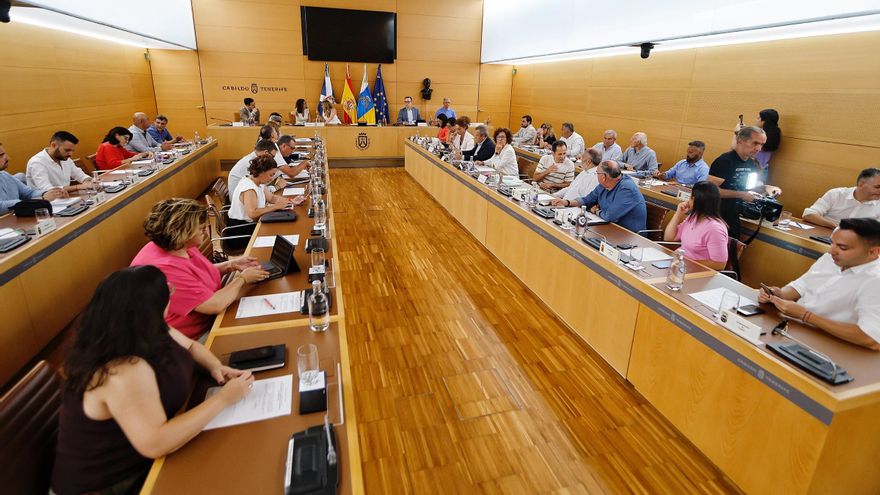
The Plenary Hall of the Tenerife Cabildo hosted the fifth meeting of the Insular Council for Territorial Administration, which brings together the mayors of the 31 councils. The summit between the Cabildo and municipalities revealed a global strategy to promote training and employment supported by a direct subsidy line of ten million euros. Other topics of discussion included mobility, housing, hydraulic works due to the declaration of water emergency, and the fire prevention operations for this summer.
Almost all the leaders attended the call from the island government to the tagoror. Just in time, the mayors of Güímar (Gustavo Pérez) and Arona (Fátima Lemes) arrived late. The president of the Cabildo, Rosa Dávila, and the insular vice president, Lope Afonso, acted as hosts. Dávila noted: “We meet practically every three or four months to monitor very important issues and the policies that need to be addressed collaboratively.”
Employment Plans
The president highlighted the employment plans, which were presented as a global measure, although they have already been developed in some municipalities. The most recent example is the direct aid of 283,000 euros to the municipality of Tegueste for the training of 22 individuals aimed at facilitating their employment and the hiring of eleven more. Dávila emphasized that “one of the main concerns of this Cabildo is to continue promoting employment plans together with the councils for the most vulnerable people.” Hence, she added, “we have allocated these ten million euros to boost the hiring of those who find it the hardest to enter the job market.”
The programmes prioritise the involvement of young people under 30 and the long-term unemployed. Furthermore, women must account for at least 50% of the hires. Participants will be trained and can access a contract in their own municipalities to work on local and social interest projects. Individuals hired by the councils will have profiles to fill both qualified and unqualified positions, as well as coordination and support roles.
Positive Data
June was again a very positive month for employment on the island, which recorded over 28,000 new contracts, marking an increase of almost 12.5% compared to the same month last year and nearly 3,000 more contracts than in May.
Housing
The insular vice president, Lope Afonso, emphasized the housing issue and informed the municipalities about the launch of the Activa Vivienda programme, aimed at mobilising land and resources to facilitate the construction of over 1,000 homes throughout the mandate (2023-2027), in collaboration with councils and public and private developers. He also highlighted the promotion of the Activa Suelo plan, which identifies land suitable for residential use and makes it available for housing development. He stressed that, through the area of Municipal Cooperation and Housing, they have become “the first Cabildo of Canaries” to directly assume the construction of public housing, with an initial tender for 193 properties distributed across five municipalities.
Water Security
Regarding the situation of hydraulic infrastructures in Tenerife, the overall assessment is that the situation has improved since the Cabildo declared water emergency in May 2024. Rosa Dávila assured that “we are now in a situation of water security with guaranteed water supply.” Over 400 million euros have been invested in purification and desalination. Additionally, projects to minimise water losses in many municipalities responsible for managing these resources, especially those with less than 10,000 inhabitants, will soon be implemented.
Mobility
The municipalities also received information about the recent initial approval of the Sustainable Mobility Plan for Tenerife, with a planned investment of over 5,000 million euros until 2035. This document was shared yesterday with the mayors to present the final proposal after the public information process.
Operational
Finally, the municipal representatives were informed about the details of the extensive operation set up for the fight against and prevention of forest fires. They were briefed on the entire deployment of the operation and the crucial role of the councils in an emergency situation, for which they must have their municipal plans updated.
Municipalism
The president of the Canarian Federation of Municipalities (Fecam) and mayor of Candelaria, Mari Brito, highlighted the importance of holding these forums “to monitor public policies affecting the island.” She stressed the prevalence “of the co-governance role that must exist between the councils and the Cabildo.” Brito mentioned the need to be “united” in employment access policies and elaborated on the case of women to ensure they have access to new niches “traditionally male-dominated.” She stated: “Without the councils, it is impossible to execute any employment or housing plan.” The mayor of La Orotava, Francisco Linares, who is also the insular general secretary of Coalición Canaria, appreciated the mayors’ readiness “without partisanship” to attend the Council, “without political caps and to work for the citizens.” He noted that “the Cabildo couldn’t seek real solutions without the cooperation of municipalism.”
Subscribe to continue reading
















